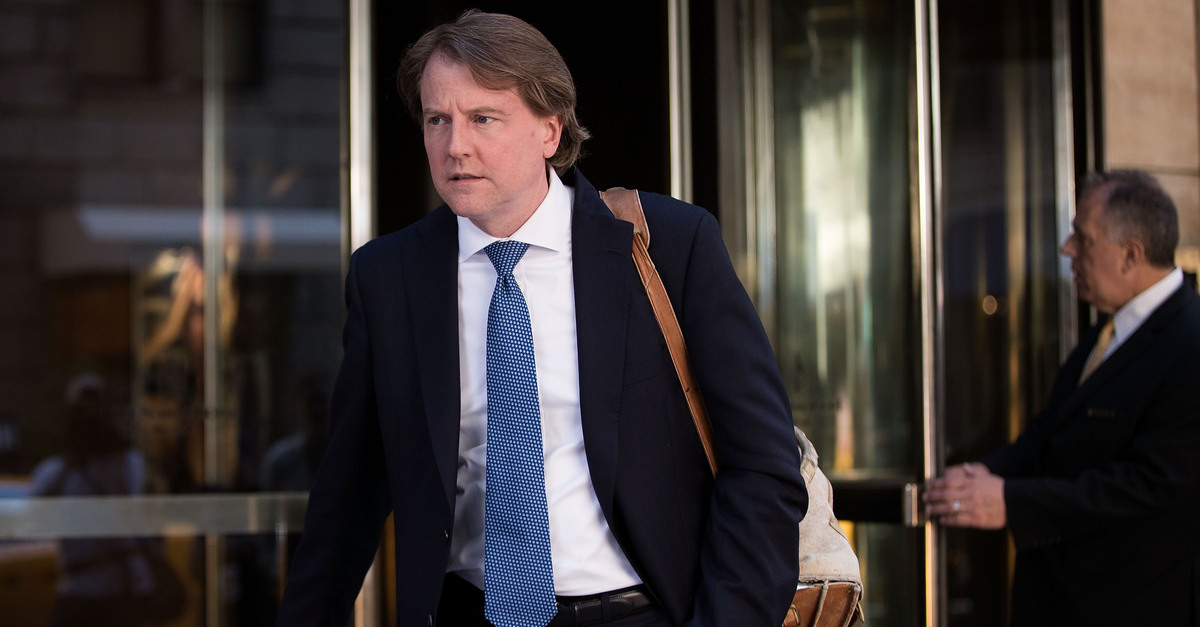
The U.S. Court of Appeals for the District of Columbia Circuit had a busy Monday, but it looks like more high-profile work is already on the horizon. House Democrats stated that they intend to petition the full D.C. Circuit to rehear their case in favor of enforcing a congressional subpoena of former White House counsel Don McGahn.
In case you missed it earlier in the day, a three-judge D.C. Circuit panel, in a 2-1 decision, ruled that “Congress has no implied constitutional power to seek civil enforcement of its subpoenas.”
“The [Judiciary] Committee thus cannot identify an underlying judicial remedy that could authorize it to invoke the Declaratory Judgment Act,” retiring Circuit Judge Thomas B. Griffith wrote. “Because the Committee lacks a cause of action to enforce its subpoena, this lawsuit must be dismissed.”
Democratic chairs of various committees in the House released a joint statement promising to petition for an en banc rehearing.
“Today’s decision in the McGahn case is clearly in error. House Committee Chairs from both parties have previously and successfully relied on the courts to enforce subpoenas — to hold otherwise would undermine a critical constitutional check on the executive branch. Just as the last decision of the panel was appealed and reversed, we expect to appeal this decision without delay to the full D.C. Circuit,” the statement said. “Witnesses have an obligation to appear and give testimony when subpoenaed by a congressional committee, and nobody—not Mr. McGahn, and certainly not President Trump—is above the law.”
The statement was issued by House Judiciary Committee Chairman Rep. Jerrold Nadler (D-N.Y.), House Intelligence Committee Chairman Rep. Adam Schiff (D-Calif.), House Oversight and Reform Committee Chairwoman Rep. Carolyn Maloney (D-N.Y.), House Foreign Affairs Committee Chairman Rep. Eliot Engel (D-N.Y.), House Financial Services Committee Chairwoman Rep. Maxine Waters (D-Calif.), and House Ways and Means Committee Chairman Rep. Richard Neal (D-Mass.).
The same three-judge panel on Monday’s decision ruled earlier this year that federal courts are prohibited from resolving subpoena disputes between the legislative and executive branches. The Court’s initial decision, which severely curbed Congress’s executive oversight capabilities, was later overturned by the full slate of judges on the court in a 7-2 en banc decision. The Court reasoned the House committee had standing to seek enforcement of the subpoena for McGahn.
The en banc court, having established that Congress had proper standing to seek judicial enforcement of the subpoena, then remanded the case back to the panel to decide whether the committee had the underlying authority to enforce its subpoena. The panel’s conclusion, which essentially declared that Congress lacks the statutory authority to seek enforcement of a subpoena, is likely to again be taken up by the full D.C. Circuit.
The controversy stems from Democrats on the House Judiciary Committee seeking McGahn’s testimony via a duly-authorized subpoena issued early in the impeachment inquiry into President Donald Trump. House investigators characterized McGahn’s knowledge of White House decisions as crucial to what special counsel Robert Mueller described as potential obstruction of justice.
After McGahn ignored a voluntary document request, Democrats issued him a testimonial subpoena in April 2019. The Trump administration then intervened demanding that McGahn flout the subpoena “in order to protect the prerogatives of the office of the presidency.”
The Department of Justice argued that the president and his closest advisors are entitled to absolute immunity from such requests and that “subjecting a senior presidential advisor to the congressional subpoena power would be akin to requiring the president himself to appear before Congress.”
Jerry Lambe contributed to this report.
[Image via Drew Angerer/Getty Images]